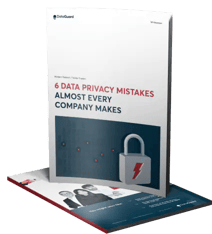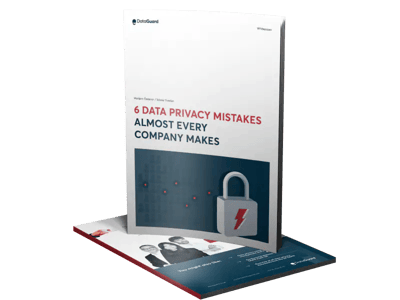Data is one of the most powerful tools for both companies and individuals.
This also means that the topic of data privacy is now more important than ever, with individuals wanting greater control over how their data is used and collected and businesses having to set up stronger security measures and processes to protect the data they collect.
So, how can you ensure that your company stays informed and updated on data privacy?
This is where Data Privacy Week, an international event by National Cybersecurity Alliance (NCA), comes in to help spread awareness and educate companies and individuals about the importance of data privacy.
In celebration of Data Privacy Week in 2023, we’ve compiled 10 tips to help you take a closer look at your company’s data privacy approach and protect the data you collect. But first, let’s learn about Data Privacy Week and its goals.
What is Data Privacy Week?
Data Privacy Week is an international event held between January 24th and 28th, 2023. This event is an expansion of the Data Privacy Day and is especially important for UK companies as it covers why it is so critical to respect the confidentiality, integrity, and availability of consumer data under the UK General Data Protection Regulation (GDPR).
Most people are unaware of how their personal data is being used, and Data Privacy Week aims to educate them about their rights as data subjects, encouraging ownership and concern for the information they share.
Data Privacy Week also informs companies on the importance of conducting their data collection practices in a way that upholds the following consumer rights and freedom:
- The right to be informed of personal data collection
- The right to access the personal data that was collected
- The right to rectification
- The right to erasure/the right to be forgotten
- The right to restrict/limit the processing of personal data
- The right to data portability
- The right to object to data collection
How can companies protect the data privacy of their consumers and employees?
As a company that handles personal data, you have a duty to your customers and employees to protect it from unauthorised access.
10 quick data privacy tips for your company:
-
Secure your employees’ access credentials
Most data breaches can be attributed to weak or stolen passwords, so securing your logins should be the first step toward strengthening your data privacy. Make it mandatory for your employees to use strong passwords, two-factor authentication, and password managers.
-
Tighten security around mobile devices
The shift to remote working has increased the risk of data breaches by unsanctioned mobile devices and unprotected public networks. Implementing security controls such as VPNs and multifactor authentication for secure access and instructing employees to report lost or stolen devices as soon as possible is critical to preventing the unauthorised disclosure of sensitive information and data.
-
Have a transparent and readily available privacy policy
Clearly outline the privacy laws applicable to your countries of operation and make this information accessible on your company’s website. Ensure the policy is easy to understand and details your company’s online information practices.
If you are a data processor, mention the types of data your company is authorised to collect and store and how this is being done. Allow your customers to contact your company if they have any privacy concerns.
-
Review your data storage and collection processes
Regularly audit the data you are holding and get rid of “dark data”, i.e. data you do not use or did not know you had. Cybercriminals can't steal what you don't have, so review your current data collection practices and policies, so you know exactly what personal information you're gathering or using. Only collect information that you need for business or legal reasons. Implementing an erasure policy is recommended.
-
Encrypt data before transmission
Encrypted data is less likely to be targeted by cybercriminals, as it turns plain text into an unreadable format that requires a password to be decrypted. This technique can be applied to anything from individual files to entire disks. Make sure customer data, such as payment information, is securely encrypted before it is transmitted.
-
Train your employees in cybersecurity and data protection
Educate your team on spotting cybersecurity risks and make sure your employees are familiar with your company’s data privacy policy. Train them on the responsible handling of sensitive data and make it mandatory to undergo annual cybersecurity/ data protection awareness training.
-
Stay updated across the board
Be sure to keep your software and servers updated. Also known as “patch management”, regularly updating your infrastructure ensures your company fixes existing security vulnerabilities and stays on top of evolving cyber threats.
-
Limit data access to a need-basis
Keep tabs on who has access to your data and limit this number to those who have your approval. Limiting access to an absolute minimum reduces the risk of loss, damage, and unauthorised disclosure. Regularly review access permissions and monitor ownership.
-
Keep your partners and customers informed
Be transparent with your business partners and customers about changes to your company’s data collection and processing policies. Inform them if you need to share their information with third parties, such as brands or advertisers, to maintain their trust.
-
Monitor and test your data systems
Perform regular penetration testing to uncover security vulnerabilities. Identify and address weaknesses in your systems before hackers take advantage of them.
Cybercriminals continue to target sensitive and personally identifiable information as hacking attempts grow more advanced every day. With this in mind, it is now essential to protect your company and its customers, employees and partners from data breaches and avoid paying the price of non-compliance.
If you’re worried about tackling this challenge alone, we are here to help.
Data privacy and your business: How can DataGuard help?
Data privacy should be prioritised as part of your business’s overall strategy. Not only is it required by law and other regulatory frameworks like the UK GDPR, but it is also a good practice in building stakeholder relations, showing that you take data privacy seriously and maintaining trust.
At DataGuard, we stay up-to-date with constantly changing data privacy requirements and advancements in cyber threats. Speak to a consultant about improving your company’s cybersecurity efforts and find out how you can demonstrate your commitment to privacy while having a leg up on the competition.
If you enjoyed reading this article, you might be interested in International Data Transfers: 10 Steps for Compliance with EU Privacy Laws.









